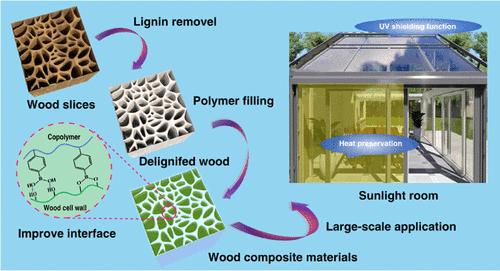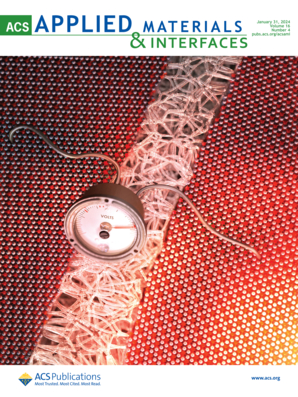Ultraviolet-Shielded Transparent Wood with Improved Interface for Insulating Windows
IF 8.3
2区 材料科学
Q1 MATERIALS SCIENCE, MULTIDISCIPLINARY
引用次数: 0
Abstract
Recently, transparent wood (TW) has been considered for many energy-efficient building products, such as windows and decorations. However, the existing TW still faces issues with size and thickness, as well as problems with functional fillers affecting the optical and mechanical properties of TW, which limits its wide application in the window products. In this study, a wood composite material (WCM) with good optical, mechanical, and thermal insulation and UV-shielding properties was prepared by using delignified wood (DW), methyl methacrylate (MMA), and 4-vinylphenylboric acid (VPBA). Compared with NaClO2 delignification, peracetic acid (PAA) preserves hemicellulose and a more stable pore structure, which facilitates the filling of polymers into the DW template, resulting in the preparation of more extensive and thicker TW. VPBA, as a functional raw material for UV shielding, on the one hand, improves the interfacial compatibility of the TW, thus improving the optical properties (transmittance of about 90%, haze of about 55%) and mechanical properties (64.5 MPa). On the other hand, WCM was found to effectively block UV–C, UV–B (about 100%), and UV-A (about 90%) radiation while maintaining sufficient visible light transmittance. In addition, as an insulating window, WCM has low thermal conductivity and can maintain a high temperature for a long time after the loss of solar radiation, which is an ideal thermal insulation material and is expected to become a potential substitute for conventional glass.

用于隔热窗的具有改进界面的紫外线屏蔽透明木材
本文章由计算机程序翻译,如有差异,请以英文原文为准。
求助全文
约1分钟内获得全文
求助全文
来源期刊

ACS Applied Materials & Interfaces
工程技术-材料科学:综合
CiteScore
16.00
自引率
6.30%
发文量
4978
审稿时长
1.8 months
期刊介绍:
ACS Applied Materials & Interfaces is a leading interdisciplinary journal that brings together chemists, engineers, physicists, and biologists to explore the development and utilization of newly-discovered materials and interfacial processes for specific applications. Our journal has experienced remarkable growth since its establishment in 2009, both in terms of the number of articles published and the impact of the research showcased. We are proud to foster a truly global community, with the majority of published articles originating from outside the United States, reflecting the rapid growth of applied research worldwide.
 求助内容:
求助内容: 应助结果提醒方式:
应助结果提醒方式:


